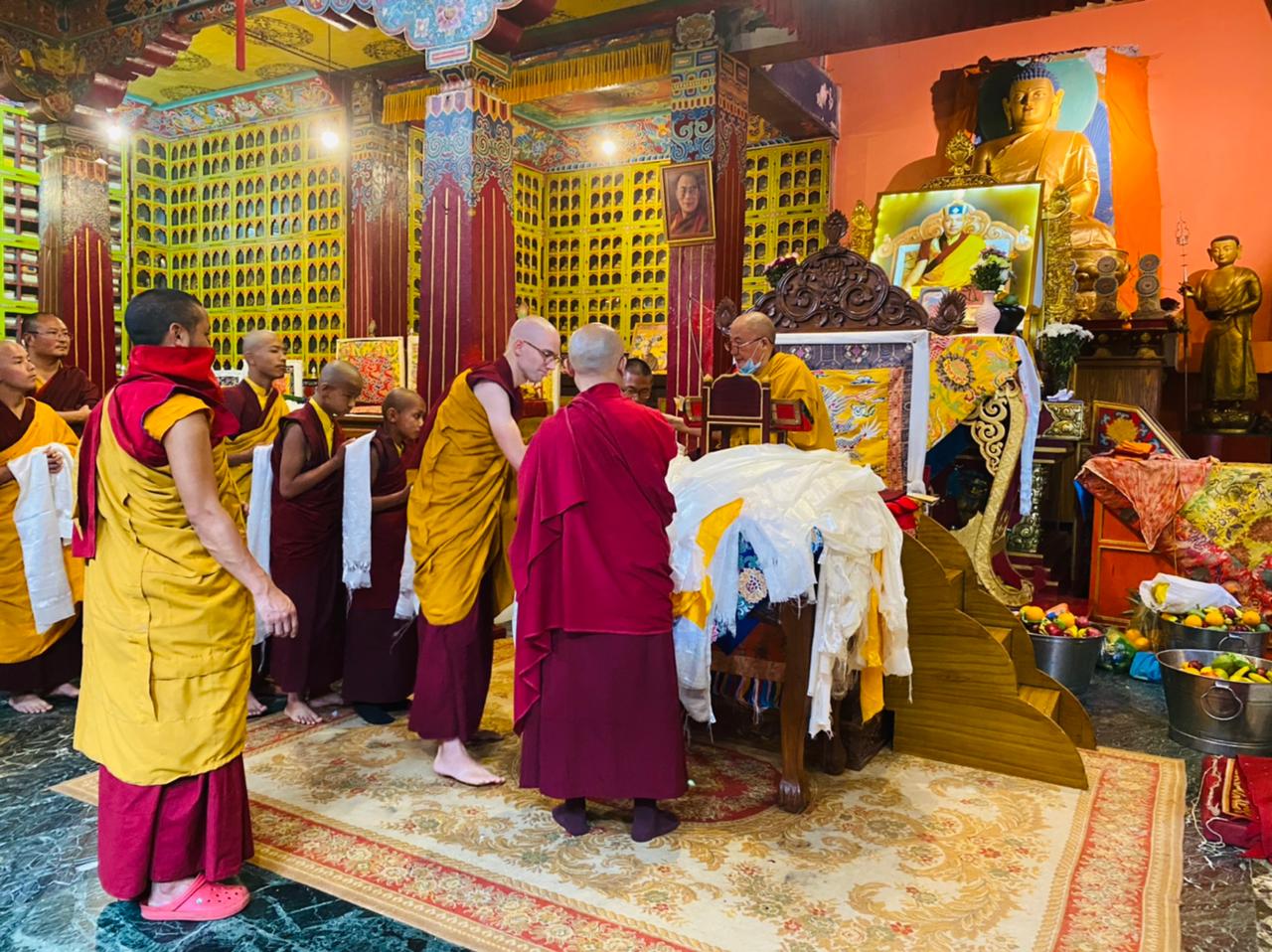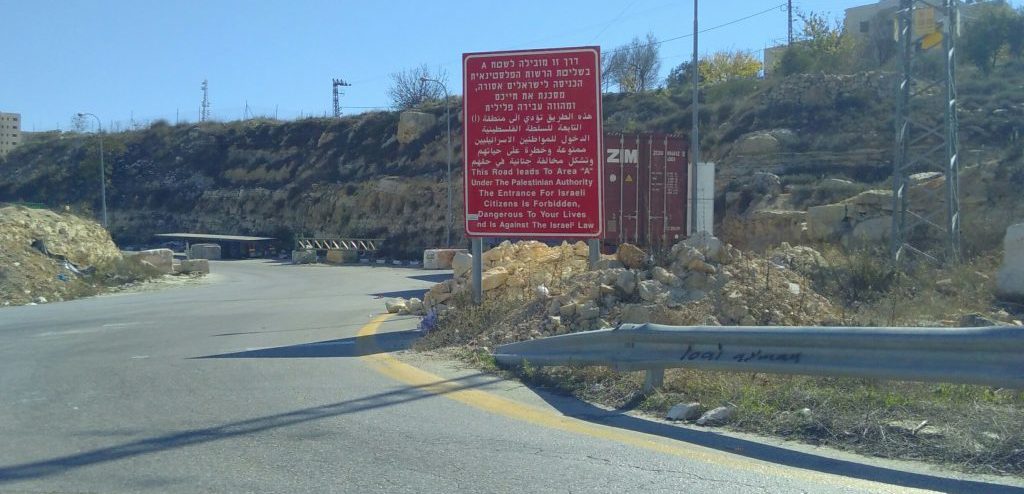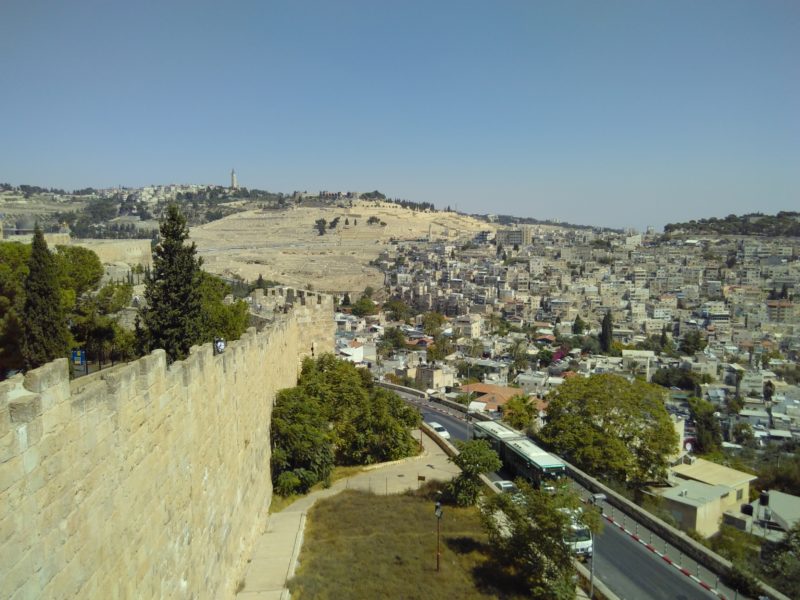At Rumtek Monastery in Sikkim from His Eminence Gyaltsab Rinpoche.
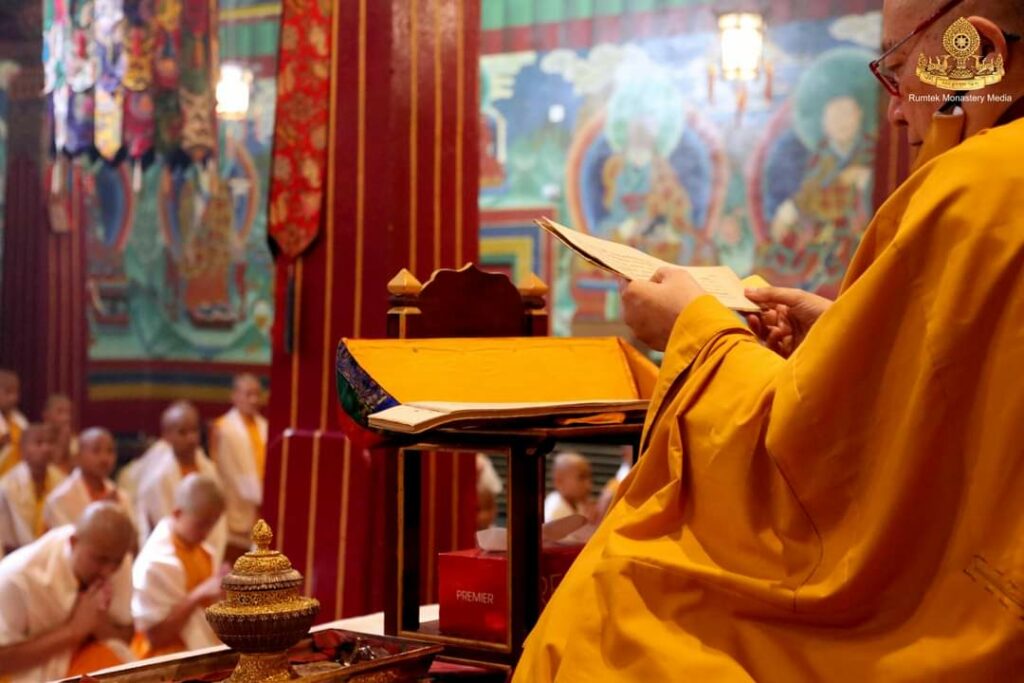
With joy, gratitude, and a renewed feeling of responsibility, I received my novice monastic vows on July 4th from His Eminence Gyaltsab Rinpoche at Rumtek Monastery in Sikkim, India. I’ve chosen to walk on this monastic path as a way of following in the footsteps of the Buddha who, after his enlightenment, began ordaining monks and nuns with the following instruction:
“Not committing any negative action, cultivating a wealth of positive actions, and taming your mind completely, this is the teaching of the enlightened one.” (Vinayvibhnaga sutra)
༼In Tibetan: སྡིག་པ་ཅི་ཡང་མི་བྱ་ཞིང་།། དགེ་བ་ཕུན་སུམ་ཚོགས་པར་བྱ།། རང་གི་སེམས་ནི་ཡོངས་སུ་གདུལ།། འདི་ནི་སངས་རྒྱས་བསྟན་པ་ཡིན།།”༽
In the Mūlasarvāstivāda tradition, novice monastics receive and abide by the 36 precepts as expounded in the Vinaya* by the Buddha. Emphasizing the importance of the Vinaya, the Buddha once said to Elder Ananda: “After my parinirvana, the Vinaya is your Master; it can sustain the Dharma forever. Even if there were only five bhiksus left who understand and observe the Vinaya, they are able to sustain the Dharma forever.” From the Vinaya, translated by the Luminary International Buddhist Society. 1https://www.monasticinitiative.org/intro-to-Vinaya
Guidance, Aspiration and little lights on the path
Under the guidance of Dzogchen Ponlop Rinpoche, my primary teacher, and Acharya Lhakpa Tshering, I continue to study the Vinaya to deepen my understanding and my practice as a monastic. As I continue to take small steps in improving my proficiency in the spoken and written Tibetan language, it is my aspiration to translate the teachings and commentaries of the Vinaya with a particular focus on texts which currently remain untranslated.
Friends, family and others sometimes ask about plans regarding my future. I don’t know what the future holds. Who does? After all, according to the Buddhist teachings at least, all things are impermanent. So, I can only say that the energy I devote to these above-mentioned activities and my continuing Nalandabodhi voluntary keep me quite busy. Though I might remain at times in the eastern parts of this world, helping to support the flourishing of the dharma, including a monastic life, especially in the western parts will also provide a sense of direction. In any case, I am confident that studying the Vinaya and the Tibetan language will surely be part of it, perhaps the rest of this life and provide little lights on my path as a simple practitioner and a Buddhist novice monk.
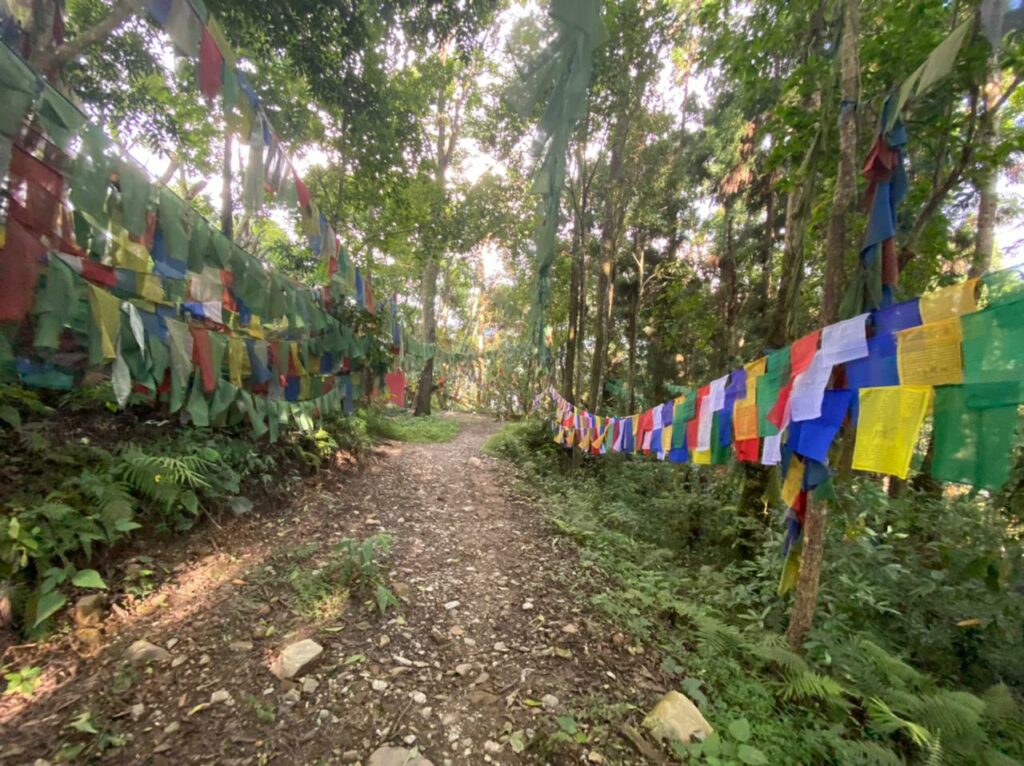
The Vinaya and the Spiritual Journey
The Vinaya is commonly understood to be a set of instructions strictly for monks and nuns, yet it can be equally relevant to everyone. Indeed, the Vinaya can be understood as a social-political philosophy of Buddhist teachings as it was greatly inspired by the Republic of Vaishali, believed to be the world’s first republic. It contains teachings on how to create kind and harmonious communities in our world. The Buddha taught that the community of dharma practitioners, known as the ordinary Sangha, is fourfold: monks, nuns, laymen, and laywomen, each having their own set of vows and practices.
With this inclusive view, it becomes evident that the monastic path is only one of many ways of practising the dharma. A spiritual journey is not necessarily a monastic one. Not even a Buddhist one. As my precious teacher, Dzogchen Ponlop Rinpoche continues to point out: “The Buddha himself was not a Buddhist.” 2https://dpr.info/articles/the-buddha-was-not-a-buddhist/ Following in the footsteps of the Buddha, practising the Dharma, and going on a spiritual journey, is all about a personal inner journey “to realize our full capacity for wakefulness and happiness.”
This spiritual journey for me started around the age of 20 by reading the works of Spinoza. During this time, I was drawn to Buddhism like a pin to a magnet and over time, I gradually developed the aspiration to follow the Buddha’s teachings and live a monastic life. Images of Tibet and of young monks and nuns awakened feelings of familiarity. More so, it felt like home. This connection carried me throughout my studies and experiences, and I discovered that Buddhism offered a view on reality, path and methods that simply made the most sense to me.
If you ask me, I would say Spinoza lived a life similar to a Buddhist monastic one. He earned enough for food, clothing, medicine, and a place to stay. In the Buddhist monastic tradition, this is also known as the four requisites. He lived a simple life dedicated to studying and sharing his contemplations with others through his writing. He believed that happiness cannot be found in the outside world and that happiness had to be cultivated from within. Perhaps these are the pursuits behind monasteries of all traditions. I feel like Spinoza and a Buddhist ‘beginner’ monk, both joyful and curious about the world while also feeling the weight of my responsibilities and living up to the teachings of the Buddha.
We can also think of Buddhism as a philosophy or a way of living our lives. No matter where and who we are and no matter what our paths look like, we share the desire to free ourselves from suffering and to be happy. Recognizing this common ground helps us understand that we are all interconnected and can help each other to cultivate sustainable happiness and bring more kindness, freedom, and peace into the world for all sentient beings.
Contemplating together
The Buddha taught that the Vinaya and the dharma, whether they take form as a spiritual journey or a philosophy of life, should be fitting (or, one could say, relevant) to the time and place. What does that mean for me, as a monastic, who aspires to explore the relevance in the context of the western world? And what does it mean for all of us in the 21st century who are facing challenges such as our ecological and climate crises? How do we cultivate a kind, compassionate heart, and contribute to the development of an altruistic society in which all life can flourish? I certainly don’t have answers to these questions. Buddha, Socrates, Spinoza, and many others, have shown that asking questions is more important than thinking we have the answer. As a friend of mine recently put it, “If we think we have the answer, we have not asked enough questions.”
I’m undecided on whether or not I will continue regularly posting to fransiscusismael.org but I would like to share contemplations every now and then. May they be beneficial to anyone. I am simply unsure what is or isn’t helpful to share and how detailed or less detailed I need to be. In the spirit of the Dao and not unlike Spinoza, I admit there is a part of me that would like to remain silent and hidden. That said, Spinoza did write many letters! Perhaps this is my way of writing letters to others, having a conversation and contemplating the meaning of life together.
In any case, if any of my writing feels helpful to you, please feel free to use it. Otherwise, simply put it aside. And if there are mistakes or writing like this makes little sense, it will be due to my own lack of clarity and understanding and for that, I apologize.
Dedication
Finally, for now, I want to thank you. Not just for taking the time to read these words but for being a necessary component of my writing. In the same way, eating a meal requires the involvement of the sun, fertile soil, seeds, bees, farmers, transport and endless other conditions, my path would not be possible without you. I cannot be who I am without you. All of us cannot be who we are without each other.
A special thanks go to my mother, family, and friends for being kind in so many ways. And to my Nalandabodhi brothers and sisters from all over the world, I thank you for your kindness and for providing a ‘place’, very much like a monastery, to study and practice. In particular, I want to mention Amina Stemmler, my awesome devoted editor, for our many discussions, contemplating together to get more clarity and help me to improve my writing [this sentence is without any editing work, so if it has errors, they are surely my own. As are probably all other errors and unclarity too].
There is a deep feeling of gratitude for my teachers and all the great masters of the past for showing us the path of awakening and pointing to the wisdom and compassion that is present in the nature of our minds. If there is any wisdom and benefit in this writing, it is surely thanks to them.
Again, with gratitude, joy, and a feeling of great responsibility, I bow down to you.
Fransiscus Ismaël
དགེ་ཚུལ་གྱི་མིང་ནི། ཀརྨ་འོད་སྲུང་རྒྱལ་མཚན།
May all sentient beings enjoy happiness and the root of happiness. May they be free from suffering and the root of suffering. May they not be separated from the great happiness devoid of suffering. May they dwell in the great equanimity that is free from passion, aggression, and prejudice.
༼The so-called four immeasurables ཚད་མེད་བཞི, in Tibetan: སེམས་ཅན་ཐམས་ཅད་བདེ་བ་དང་བདེ་བའི་རྒྱུ་དང་ལྡན་པར་གྱུར་ཅིག །སེམས་ཅན་ཐམས་ཅད་སྡུག་བསྔལ་དང་སྡུག་བསྔལ་གྱི་རྒྱུ་དང་བྲལ་བར་གྱུར་ཅིག །སེམས་ཅན་ཐམས་ཅད་སྡུག་བསྔལ་མེད་པའི་བདེ་བ་དང་མི་འབྲལ་བར་གྱུར་ཅིག །སེམས་ཅན་ཐམས་ཅད་ཉེ་རིང་ཆགས་སྡང་གཉིས་དང་བྲལ་བའི་བཏང་སྙོམས་ལ་གནས་པར་གྱུར་ཅིག༽
